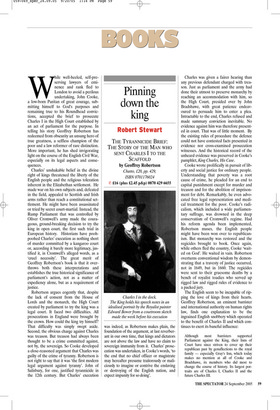Pinning down the king
Robert Stewart
THE TYRANNICIDE BRIEF: THE STORY OF THE MAN WHO SENT CHARLES I TO THE SCAFFOLD by Geoffrey Robertson Chatto, £20, pp. 429, ISBN 0701176024 ✆ £16 (plus £2.45 p&p) 0870 429 6655 While well-heeled, self-preserving lawyers of eminence and rank fled to London to avoid a perilous undertaking, John Cooke, a low-born Puritan of great courage, submitting himself to God’s purposes and remaining true to his Roundhead convictions, accepted the brief to prosecute Charles I in the High Court established by an act of parliament for the purpose. In telling his story Geoffrey Robertson has redeemed from obscurity an unsung hero of true greatness, a selfless champion of the poor and a law reformer of rare distinction. More important, he has shed invigorating light on the course of the English Civil War, especially on its legal aspects and consequences.
Charles’ unshakable belief in the divine right of kings threatened the liberty of the English people and the religious toleration inherent in the Elizabethan settlement. He made war on his own subjects and, defeated in the field, appealed to Scottish and Irish arms rather than reach a constitutional settlement. He might have been assassinated or tried by secret court-martial. Instead, the Rump Parliament that was controlled by Oliver Cromwell’s army made the courageous, ground-breaking decision to try the king in open court, the first such trial in European history. Historians have poohpoohed Charles’ execution as nothing short of murder committed by a kangaroo court or, according it barely more legitimacy, justified it, in Cromwell’s alleged words, as a ‘cruel necessity’. The great merit of Geoffrey Robertson’s book is that it overthrows both these interpretations and establishes the true historical significance of parliament’s action, not as a matter of expediency alone, but as a requirement of justice.
Robertson argues cogently that, despite the lack of consent from the House of Lords and the monarch, the High Court created by parliament to try the king was a legal court. It faced two difficulties. All prosecutions in England were brought by the crown. How could the king try himself? That difficulty was simply swept aside. Second, the obvious charge against Charles was treason. But treason had always been thought to be a crime committed against, not by, the sovereign. So Cooke developed a close-reasoned argument that Charles was guilty of the crime of tyranny. Robertson is not right to say that it was ‘the first modern legal argument against tyranny’. John of Salisbury, for one, justified tyrannicide in the 12th century. But Charles’ execution was indeed, as Robertson makes plain, the foundation of the argument, at last reverberant in our own time, that kings and dictators are not above the law and have no claim to sovereign immunity from it. Charles’ prosecution was undertaken, in Cooke’s words, ‘to the end that no chief officer or magistrate may hereafter presume traitorously or maliciously to imagine or contrive the enslaving or destroying of the English nation, and expect impunity for so doing’. Charles was given a fairer hearing than any previous defendant charged with treason. Just as parliament and the army had done their utmost to preserve monarchy by reaching an accommodation with him, so the High Court, presided over by John Bradshawe, with great patience endeavoured to persuade him to enter a plea. Intractable to the end, Charles refused and made summary conviction inevitable. No evidence against him was therefore presented in court. That was of little moment. By the existing rules of procedure the defence could not have contested facts presented in evidence nor cross-examined prosecution witnesses. And the historical record of the unheard evidence was preserved in Cooke’s pamphlet, King Charles, His Case.
Cooke wrote prolifically in pursuit of liberty and social justice for ordinary people. Understanding that poverty was a root cause of crime, he pleaded for an end to capital punishment except for murder and treason and for the abolition of imprisonment for debt. Remarkably, he even advocated free legal representation and medical treatment for the poor. Cooke’s radicalism, which included a wide parliamentary suffrage, was drowned in the deep conservatism of Cromwell’s regime. Had his reform agenda been implemented, Robertson muses, the English people might have been won over to republicanism. But monarchy was restored and the regicides brought to book. Once again, while others fled the country, Cooke ‘waited on God’. He waited in vain. Robertson overturns conventional wisdom by demonstrating that a travesty of justice occurred, not in 1649, but in 1660. The regicides were sent to their gruesome deaths by a bench of royalist toadies who served up rigged law and rigged rules of evidence to a packed jury.
The English seem to be incapable of ripping the love of kings from their hearts. Geoffrey Robertson, an eminent barrister and international authority on human rights law, finds one explanation to be the ingrained English snobbery which operated to the benefit of Charles II and which continues to exert its baneful influence:
Although most barristers supported Parliament against the King, their Inns of Court have since striven to cover up their republican past by genuflections to the royal family — especially Gray’s Inn, which today makes no mention at all of Cooke and Bradshawe, its members who did most to change the course of history. Its largest portraits are of Charles I, Charles II and the future Charles III.
































































 Previous page
Previous page